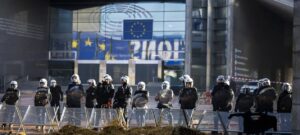 At the EU Summit in Brussels, leaders convene to discuss supporting farmers, providing aid to Ukraine, and addressing controversy surrounding arms funding and expansion proposals.
At the EU Summit in Brussels, leaders convene to discuss supporting farmers, providing aid to Ukraine, and addressing controversy surrounding arms funding and expansion proposals.
Farmers’ Anger, Arms Aid, and Expansion Plans
The 27 heads of state and government are once again deliberating at the EU Summit in Brussels on measures to support farmers and provide assistance to Ukraine. Controversy is expected to arise on additional matters.
Tractor noise and sirens have been the backdrop for weeks during meetings of leading EU politicians in Brussels. Farmers are gearing up to make their voices heard at the summit of state and government leaders. The EU Commission has already announced extensive concessions that member states still need to approve. Brussels aims to remove controls for small farms and relax environmental regulations. The obligation to set aside part of arable land for species protection will also continue to be suspended in the upcoming years.
In Germany, France, Poland, the Netherlands, and Belgium, farmers have protested in recent months against the policies of their governments and the EU. They are concerned about declining incomes, excessive bureaucracy, and additional regulations due to new environmental laws from Brussels. In Germany, farmers protested against the planned removal of tax exemptions on agricultural diesel. In France and Poland, they demonstrated against the price decline caused by imports from Ukraine. Just this week, EU member states and parliament agreed to limit the duty-free import of certain Ukrainian agricultural products. If large quantities of eggs, poultry, or sugar come from there to the EU, tariffs will be applied.
Arms Aid from Interest Earnings?
As with practically all EU Summits since the start of the Russian aggression in Ukraine over two years ago, President Volodymyr Zelensky is connected via video this time as well. He is likely to make an urgent appeal to the 27 EU countries to deliver more weapons and ammunition. The summit will discuss where the funding for this should come from. Earlier this week, EU foreign ministers gave the green light to increase a fund by five billion euros, separate from the EU budget, to pay for weapons and equipment for Ukraine.
Additionally, the EU Commission aims to tap into interest earnings from frozen assets of the Russian Central Bank in the EU for military aid. Brussels anticipates potential annual revenues of three billion euros. However, a unanimous decision of member states is required for this. German Chancellor Olaf Scholz is in favor of this. The debate on this matter is likely to start at the EU Summit.
More Funds for Defense
The heads of state and government want to discuss fundamentally how they can ramp up arms production and allocate more funds for defense in the face of the Russian threat to Europe. EU Council President Charles Michel emphasizes in his invitation letter that Europe has inadequately invested in its security and defense for decades. Now is the time for radical and concrete steps.
France’s proposal to take on joint debts as during the COVID-19 pandemic for this purpose is controversial. Germany rejects such plans. However, member states aim to utilize the European Investment Bank more for defense. The European Investment Bank (EIB) already supports the development of drones and the enhancement of border security. But it is only allowed to finance dual-use goods, products that can be used for both civilian and military purposes. Its mandate excludes the financing of weapons and ammunition. The summit could call on the EIB to revise the criteria for dual-use goods to provide the defense industry with better access to private and public funding.
Controversies regarding Bosnia and Herzegovina…
A week and a half ago, the EU Commission recommended initiating accession negotiations with Bosnia and Herzegovina. Commission President Ursula von der Leyen justifies this decision based on what she sees as impressive progress in reforms. The country report from her body in November sounded different. Germany, Austria, and Italy also aim to bring the Balkan state closer to the EU, akin to what the EU has done with Ukraine and Moldova.
Last December, the heads of state and government agreed in principle to start accession talks with both countries. However, the negotiating mandate is still pending. Yet, France and the Netherlands express concerns regarding Bosnia, with Paris believing it is not yet time for accession negotiations. The summit can only grant approval unanimously.
